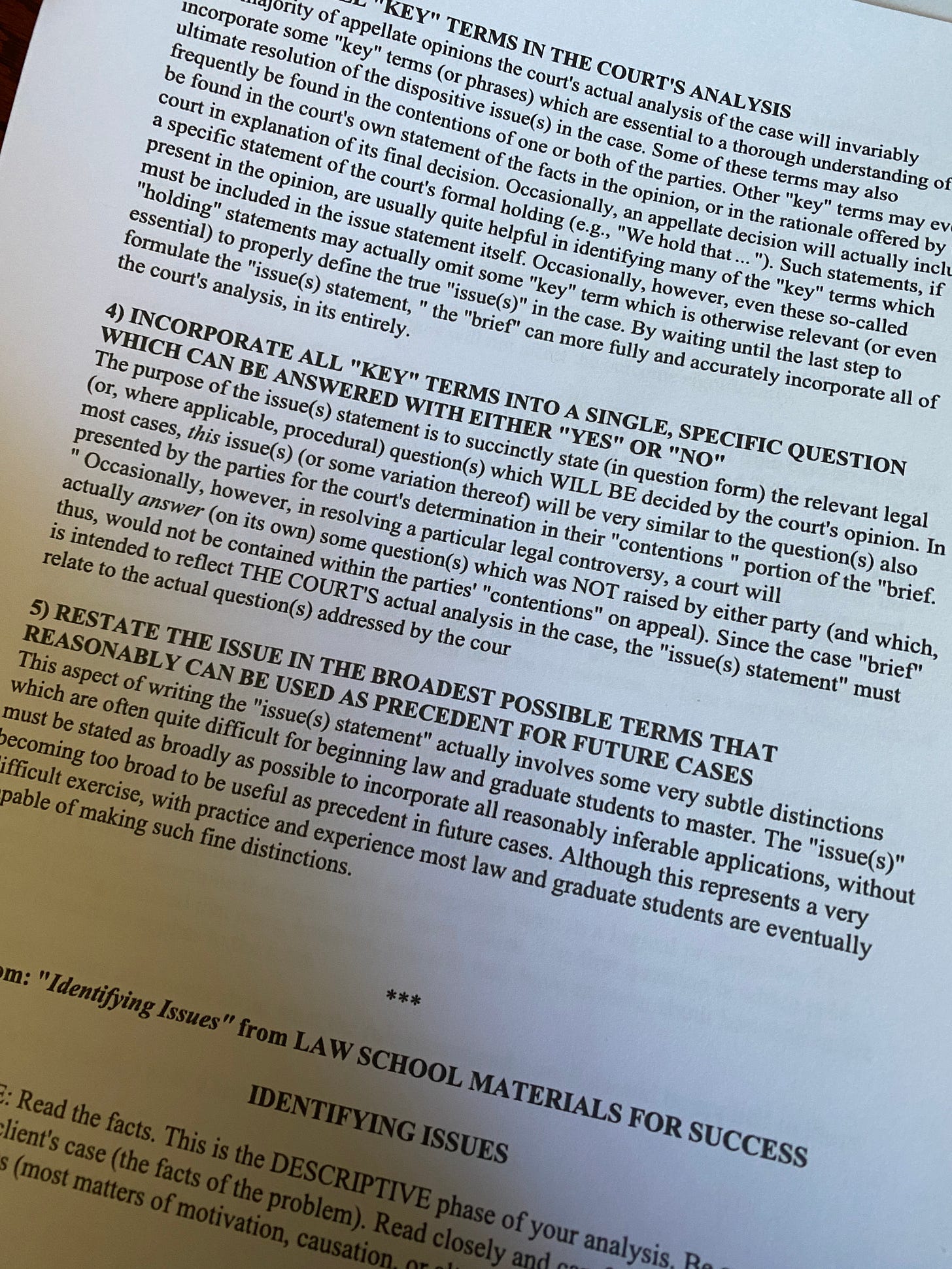School’s going well, thanks. Four classes down, six to go and then I’ll be a bona fide master of legal studies. I’m taking two 7.5-week classes at a time so I can jam the entire program into one tidy year and, up until a couple days ago, I felt pretty good about being on track.
Then “American Common Law System I” started up and, well, let me just say that it’s kicking my pedestrian butt. After eight classes, I’m starting to get the hang of it – the terminology, the triple-negatives, the concept of consideration as something other than holding the door open for the guy wrestling with too much luggage.
The professor intersperses lectures with a series of things they call the Skills Workshops. I’m new at this whole legal thing, so skills and workshops are right in my wheelhouse. Until I got to SKILLS WORKSHOP 4, all about how to write a case brief (something required in the first four classes I’ve taken, each professor demanding a different format for the purportedly individualized study guides). The purpose of SKILLS WORKSHOP 4, it says, is to show us how to write clear and concise case briefs.
So here, verbatim and with all font differentials copied directly from the assignment sheet, I offer two examples. The first, a warning:
Your answers to this assignment like all of the writing requirements for this course, must STRICTLY conform to the Rules for Legal Writing in ACLS I (see Skills Workshop 2 Reading Assignment B), and will be graded on this Rules conforming basis and the substantive quality of your answers to the assignment.
Fair enough, I guess, but the emphasis on Rules conforming basis cracks me up. STRICTLY.
Here’s one about why it’s important to be concise in your writing.
INCORPORATE ALL “KEY” TERMS INTO A SINGLE, SPECIFIC QUESTION WHICH CAN BE ANSWERED WITH EITHER “YES” OR “NO”
The purpose of the issue(s) statement is to succinctly state (in question form) the relevant legal (or, where applicable, procedural) question(s) which WILL BE decided by the court’s opinion. In most cases, this issue(s) (or some variation thereof) will be very similar to the question(s) also presented by the parties for the court’s determinations in their “contentions” portion of the “brief.” Occasionally, however, in resolving a particular legal controversy, a court will actually answer (on its own) some question(s) which was NOT raised by either party (and which, thus, would not be contained within the parties’ “contentions” on appeal). Since the case “brief” is intended to reflect THE COURT’S actual analysis in the case, the “issue(s) statement” must relate to the actual question(s) addressed by the court.
Did you get all that? I’ve read it a few times and am one part amused, one part annoyed, and one part huh? What’s with all these “quotation marks” surround words like “key” and “brief”?
Of course I had to put the question to the course coordinator, noting my observation that this is all a lot of form over function and asking if we’re being graded first on the Rules conforming basis or on the substantive quality of our answers.
The reply, in part: “Every student needs to know how to write a case brief. The second half of the class requires at least five per week.”
Should I be concerned that this is the person grading my papers? Maybe I’m too old for this. It’s already bizarre enough to be this age and working for a grade, but hey, going back to school was my choice and I knew what was coming. I’m a little concerned that, at least for this round, form will outweigh function and my, shall we say, less formal style of writing might get its righteous comeuppance.
So if my “writing”(s) get a little More UPTIGHT over the next “few” week(s), I hope you(‘ll) forgive the momentary “lapse.”



Good luck man!
"Uptight (Everything's Alright)" LOL
Kudos to you for summoning the brain power to do what you're doing. Just don't get so bogged down that you forget how to REALLY argue a legal case:
Daffy Duck : Where were you the night of April the 16th?
Butler : I... I...
Daffy Duck : A likely story! I see it all now, you and the upstairs maid. "Do the old boy in" you said. "Elderberry wine and old lace" you said. "Then, the quick getaway" you said. Rio De Janerio, tropical nights, romance and a heavy bank account!
Butler : No! No!
Daffy Duck : Yes! Yes! But, you weren't smart enough John. Alias Johnnie. Alias Jack. Alias Jackie! Phew! (What's Humphrey Bogart got that I ain't got?)